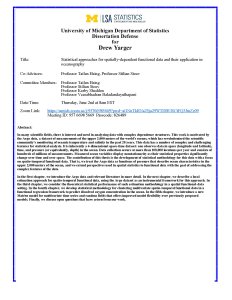Presented By: Department of Statistics Dissertation Defenses
Statistical approaches for spatially-dependent functional data and their application in oceanography
Drew Yarger

Abstract:
In many scientific fields, there is interest and need in analyzing data with complex dependence structures. This work is motivated by the Argo data, a dataset of measurements of the upper 2,000 meters of the world's oceans, which has revolutionized the scientific community's monitoring of oceanic temperature and salinity in the past 20 years. This data has a number of complex and challenging features for statistical analysis. It is inherently a 4-dimensional space-time dataset: one observes data in space (longitude and latitude), time, and pressure (or equivalently, depth) in the ocean. Data collection occurs at more than 100,000 locations per year and consists of hundreds of millions of measurements. Measured ocean variables display nonstationarity as their statistical properties significantly change over time and over space. The contribution of this thesis is the development of statistical methodology for this data with a focus on spatio-temporal functional data. That is, we treat the Argo data as functions of pressure that describe ocean characteristics in the upper 2,000 meters of the ocean, and we extend perspectives used in spatial statistics to functional data with the goal of addressing the complex features of the data.
In the first chapter, we introduce the Argo data and relevant literature in more detail. In the next chapter, we describe a local estimation approach for spatio-temporal functional data, using the Argo dataset as an instrumental framework for this approach. In the third chapter, we consider the theoretical statistical performance of such estimation methodology in a spatial functional-data setting. In the fourth chapter, we develop statistical methodology for clustering multivariate spatio-temporal functional data in a functional regression framework to predict dissolved oxygen concentration in the ocean. In the fifth chapter, we introduce a new Matérn model for multivariate time series and random fields that offers improved model flexibility over previously proposed models. Finally, we discuss open questions that have arisen from our work.
In many scientific fields, there is interest and need in analyzing data with complex dependence structures. This work is motivated by the Argo data, a dataset of measurements of the upper 2,000 meters of the world's oceans, which has revolutionized the scientific community's monitoring of oceanic temperature and salinity in the past 20 years. This data has a number of complex and challenging features for statistical analysis. It is inherently a 4-dimensional space-time dataset: one observes data in space (longitude and latitude), time, and pressure (or equivalently, depth) in the ocean. Data collection occurs at more than 100,000 locations per year and consists of hundreds of millions of measurements. Measured ocean variables display nonstationarity as their statistical properties significantly change over time and over space. The contribution of this thesis is the development of statistical methodology for this data with a focus on spatio-temporal functional data. That is, we treat the Argo data as functions of pressure that describe ocean characteristics in the upper 2,000 meters of the ocean, and we extend perspectives used in spatial statistics to functional data with the goal of addressing the complex features of the data.
In the first chapter, we introduce the Argo data and relevant literature in more detail. In the next chapter, we describe a local estimation approach for spatio-temporal functional data, using the Argo dataset as an instrumental framework for this approach. In the third chapter, we consider the theoretical statistical performance of such estimation methodology in a spatial functional-data setting. In the fourth chapter, we develop statistical methodology for clustering multivariate spatio-temporal functional data in a functional regression framework to predict dissolved oxygen concentration in the ocean. In the fifth chapter, we introduce a new Matérn model for multivariate time series and random fields that offers improved model flexibility over previously proposed models. Finally, we discuss open questions that have arisen from our work.